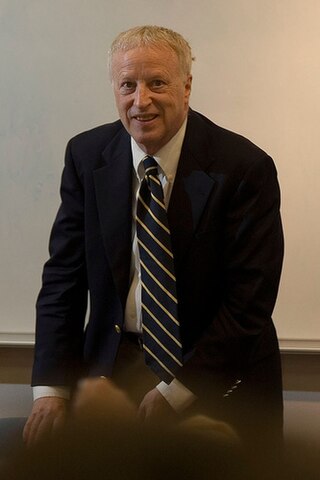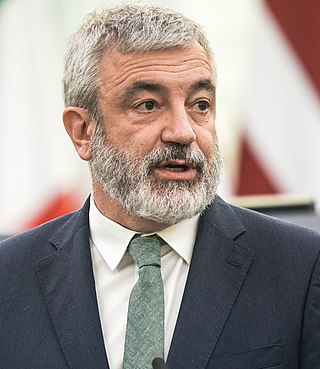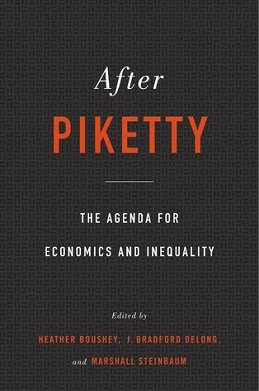Related Research Articles

George Arthur Akerlof is an American economist and a university professor at the McCourt School of Public Policy at Georgetown University and Koshland Professor of Economics Emeritus at the University of California, Berkeley. Akerlof was awarded the 2001 Nobel Memorial Prize in Economic Sciences, jointly with Michael Spence and Joseph Stiglitz, "for their analyses of markets with asymmetric information."
The Walter A. Haas School of Business is the business school of the University of California, Berkeley, a public research university in Berkeley, California. It was the first business school at a public university in the United States.

James Bradford "Brad" DeLong is an American economic historian who has been a professor of economics at the University of California, Berkeley since 1993.

Juliet B. Schor is an American economist and Sociology Professor at Boston College. She has studied trends in working time, consumerism, the relationship between work and family, women's issues and economic inequality, and concerns about climate change in the environment. From 2010 to 2017, she studied the sharing economy under a large research project funded by the MacArthur Foundation. She is currently working on a project titled "The Algorithmic Workplace" with a grant from the National Science Foundation.
Delhi School of Economics (DSE), popularly referred to as D School, is an institution of higher learning within the University of Delhi. The Delhi School of Economics is situated in University of Delhi's North Campus in Maurice Nagar. Established in 1949, the campus of the Delhi School of Economics houses the University of Delhi's departments of Economics, Sociology, Geography and Commerce, as well as the Ratan Tata Library. Out of the four academic departments, the Departments of Economics, Sociology and Geography come under the Faculty of Social Sciences, while the Department of Commerce comes under the Faculty of Commerce and Business Studies.

Alan Bennett Krueger was an American economist who was the James Madison Professor of Political Economy at Princeton University and Research Associate at the National Bureau of Economic Research. He served as Assistant Secretary of the Treasury for Economic Policy, nominated by President Barack Obama, from May 2009 to October 2010, when he returned to Princeton. He was nominated in 2011 by Obama as chair of the White House Council of Economic Advisers, and served in that office from November 2011 to August 2013.

David John Teece is a New Zealand-born US-based organizational economist and the Professor in Global Business and director of the Tusher Center for the Management of Intellectual Capital at the Walter A. Haas School of Business at the University of California, Berkeley.

Wendy L. Brown is an American political theorist. She is the UPS Foundation Professor in the School of Social Science at the Institute for Advanced Study in Princeton, NJ. Previously, she was Class of 1936 First Professor of Political Science and a core faculty member in The Program for Critical Theory at the University of California, Berkeley.

Eswar Shanker Prasad is an Indian-American economist. He is the Tolani Senior Professor of International Trade Policy at Cornell University and a senior fellow at the Brookings Institution, where he holds the New Century Chair in Economics.

Emmanuel Saez is a French, naturalized American economist who is Professor of Economics at the University of California, Berkeley. His work, done with Thomas Piketty and Gabriel Zucman, includes tracking the incomes of the poor, middle class and rich around the world. Their work shows that top earners in the United States have taken an increasingly larger share of overall income over the last three decades, with almost as much inequality as before the Great Depression. He recommends much higher marginal tax rates, of up to 70% or 90%. He received the John Bates Clark Medal in 2009, a MacArthur "Genius" Fellowship in 2010, and an honorary degree from Harvard University in 2019.

Luis Garicano Gabilondo is a Spanish economist and politician who was a Member of the European Parliament (MEP) from 2019 to 2022. He was also vice president of Renew Europe and vice president of the European political party Alliance of Liberals and Democrats for Europe. Before entering politics, he was a professor of strategy and economics at IE Business School in Madrid and at the London School of Economics (LSE). After leaving the European Parliament he has returned to academia as a visiting professor at Columbia Business School and at the University of Chicago Booth School of Business.
Duncan K. Foley is an American economist. He is the Leo Model Professor of Economics at the New School for Social Research and an External Professor at the Santa Fe Institute. Previously, he was Associate Professor of Economics at MIT and Stanford, and Professor of Economics at Columbia University. He has held visiting professorships at Woodrow Wilson School at Princeton University, UC Berkeley, and Dartmouth College, as well as the New School for Social Research.
Michael Reich is a Polish-born economist who primarily focuses on labor economics and political economy. Currently, Reich is a professor of economics and co-chair of the Center on Wage and Employment Dynamics at the Institute for Research on Labor and Employment (IRLE) at the University of California at Berkeley. He served as director of IRLE from 2004 to 2015. In 1968, he helped found the Union for Radical Political Economics.

Gabriel Zucman is a French economist who is currently an associate professor of public policy and economics at the University of California, Berkeley‘s Goldman School of Public Policy, Chaired Professor at the Paris School of Economics, and Director of the EU Tax Observatory.

Clair Brown is an American economist who is Professor of Economics and Director of the Center for Work, Technology, and Society at the University of California, Berkeley. Brown is a past Director of the Institute of Industrial Relations (IRLE) at UC Berkeley. Brown has published research on many aspects of how economies function, including high-tech industries, development engineering, the standard of living, wage determination, poverty, and unemployment.
The Curriculum Open-Access Resources in Economics Project is an organisation that creates and distributes open-access teaching material on economics. The goal is to make teaching material and reform the economics curriculum. Its textbook is taught as an introductory course at almost 400 universities. It provides its materials online, at no cost to users. It is registered as a charity in England and Wales.

Philip Nathan Jefferson is an American economist who has been serving as 23rd Vice Chair of the Federal Reserve since September 2023. He has been a member of the Federal Reserve Board of Governors since 2022. He was nominated for the position by President Joe Biden in January 2022, and was confirmed by the Senate in May 2022. Upon taking office, he became the fourth Black man to serve on the board.
Arindrajit (Arin) Dube is a professor of economics at the University of Massachusetts Amherst, known internationally for his empirical research on the effects of minimum wage policies. He is among the foremost scholars regarding the economic impact of minimum wages. In 2019, he was asked by the UK Treasury to conduct a review of the evidence on the impact of minimum wages, which informed the decision to set the level of the National Living Wage. His work is focused on the economics of the labor market, including the role of imperfect competition, institutions, norms, and behavioral factors that affect wage setting and jobs.
Donald Jasper Harris is a Jamaican-American economist and professor emeritus at Stanford University, known for applying post-Keynesian ideas to development economics. He is the father of the 49th and current vice president of the United States, Kamala Harris, as well as of her sister, lawyer and political commentator Maya Harris.

After Piketty: The Agenda for Economics and Inequality is a 2017 collection of essays edited by the economists Heather Boushey, J. Bradford DeLong, and Marshall Steinbaum. The essays center on how to integrate inequality into economic thinking. Common themes are Thomas Piketty’s influence on academia and policy, the need for better wealth data, inequality in the United States, and the reasons for the process of wealth accumulation and rising inequality discussed by Piketty in his book Capital in the Twenty-First Century (2013). In the final entry, Piketty himself responds to the essays.
References
- 1 2 "Suresh Naidu | Columbia | Economics" . Retrieved 2023-09-10.
- ↑ Kenigsberg, Ben (2020-04-30). "'Capital in the Twenty-First Century' Review: Economic History, Illustrated". The New York Times. ISSN 0362-4331 . Retrieved 2023-09-10.
- 1 2 Adkins, Lisa; Cooper, Melinda; Konings, Martijn (May 2021). "Class in the 21st century: Asset inflation and the new logic of inequality". Environment and Planning A: Economy and Space. 53 (3): 548–572. doi: 10.1177/0308518X19873673 . ISSN 0308-518X.
- ↑ "Institute for New Economic Thinking". Institute for New Economic Thinking. Retrieved 2023-09-10.
- ↑ ""Noncompete Clauses" Should Be Outlawed — but Not in the Name of "More Competition"". jacobin.com. Retrieved 2023-09-10.
- ↑ Naidu, Suresh (2017-07-02). "'Inequality changes the system'". The Hindu. ISSN 0971-751X . Retrieved 2023-09-10.